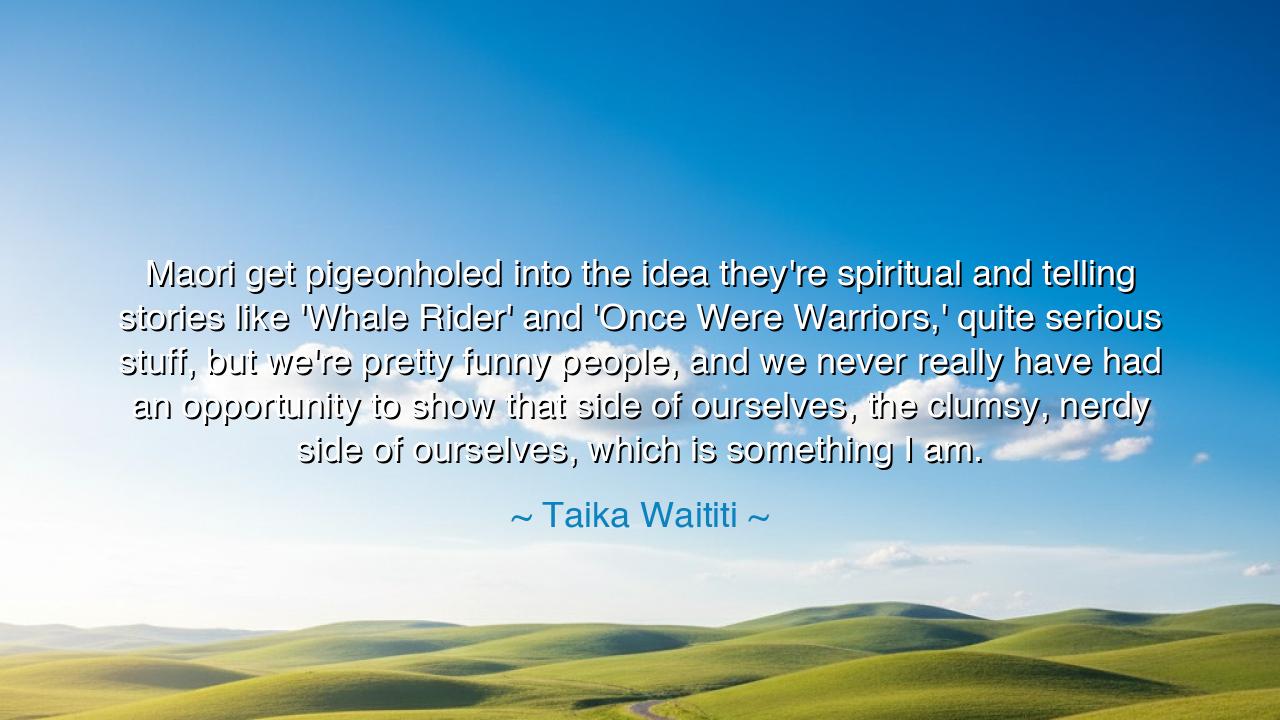
Maori get pigeonholed into the idea they're spiritual and telling
Maori get pigeonholed into the idea they're spiritual and telling stories like 'Whale Rider' and 'Once Were Warriors,' quite serious stuff, but we're pretty funny people, and we never really have had an opportunity to show that side of ourselves, the clumsy, nerdy side of ourselves, which is something I am.






Hear now the words of Taika Waititi, the storyteller of both laughter and soul, who said: “Maori get pigeonholed into the idea they're spiritual and telling stories like 'Whale Rider' and 'Once Were Warriors,' quite serious stuff, but we're pretty funny people, and we never really have had an opportunity to show that side of ourselves, the clumsy, nerdy side of ourselves, which is something I am.” In these words lies a cry both joyful and profound—the yearning of a people to be seen not through the narrow eyes of stereotype, but through the vast truth of their humanity. It is a declaration that identity is not a single mask, but a constellation of faces, and that laughter, too, is sacred.
For centuries, cultures have been flattened by perception, reduced by others to symbols instead of stories. The Maori, noble keepers of spirit and land, have long been shown to the world through the solemnity of myth and the wounds of history. Their power is undeniable—but, as Taika reminds us, power also dances, jokes, and trips over its own feet. In his words we find both rebellion and renewal: rebellion against the cage of expectation, and renewal of the full, living image of a people who contain both strength and silliness, both gravitas and joy. His laughter is not the absence of depth—it is the proof that spirit and humor dwell in the same heart.
Consider the ancient Greeks, who carved marble gods of wisdom and war, yet also filled their theaters with comedies that mocked kings, philosophers, and even the gods themselves. They understood what Taika understands: that comedy is not the enemy of dignity, but its companion. Laughter is the sign that a people are alive enough to play with their own reflection. To laugh at oneself is to declare, “I am not your statue; I breathe.” In this sense, Taika’s humor is not a mask, but a mirror—a mirror that shows the wholeness of the Maori spirit, not the fragments outsiders choose to see.
When he speaks of being “clumsy” and “nerdy,” he reclaims what the world might call weakness and turns it into art. This is a warrior of a different kind—one who wields humor as his weapon, who disarms prejudice not by anger, but by absurdity. Through films like Boy, Hunt for the Wilderpeople, and Thor: Ragnarok, he gives voice to the awkward, the imperfect, the joyful fool within every person. In his art, the Maori identity is no longer confined to tragedy or mysticism; it is free to laugh, to be ordinary, to be human. This is the evolution of culture through storytelling—to add lightness without losing depth.
And yet, there is pain beneath the jest. For when a people are seen only through sorrow, they are half-erased. To be defined only by one’s suffering is a kind of captivity. Taika’s words remind us that humor itself can be an act of liberation. In every joke he makes, there echoes a deeper truth: “See us as we are—all of us.” His laughter, therefore, is a spiritual act. It is the voice of ancestors saying, “We have survived long enough to laugh again.” The world may celebrate the warrior, but it must also honor the clown, for both preserve the tribe.
Let us look, then, to another story from long ago: the tale of Nasreddin, the wise fool of the Middle East. He was mocked for his silliness, yet his foolishness revealed the deepest wisdom. One day, when people laughed at him for riding his donkey backward, he said, “It is not I who am backwards, but the world.” So too does Taika ride the donkey of storytelling in reverse—against expectation, against solemnity—and in doing so, shows us a truer direction: toward wholeness. For the fool and the philosopher are two sides of the same coin; both seek truth, but one seeks it with laughter.
So, children of spirit and mirth, take this teaching to heart: you are not one story. Refuse the simplicity of labels. Let the world see your depth, yes—but also your ridiculousness, your clumsiness, your joy. To hide your humor is to dim your light. To laugh, even in the shadow of history, is to claim freedom. As Taika Waititi reminds us, the full truth of identity is not solemn—it is radiant, messy, and alive.
Therefore, laugh boldly. Tell your stories in every tone: the sacred and the silly, the tearful and the absurd. For laughter, too, is a prayer, and joy is a weapon against invisibility. When you live this truth, you honor not only yourself but your ancestors, who carried both pain and laughter across generations. And perhaps then, like Taika, you will stand before the world and say—not with apology, but with pride—“I am all of it. The serious. The funny. The spiritual. The human.”






AAdministratorAdministrator
Welcome, honored guests. Please leave a comment, we will respond soon